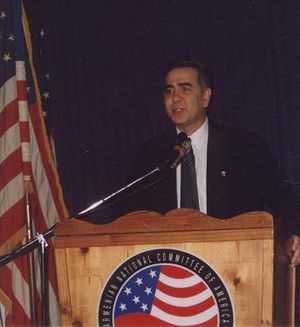|
By Harut Sassounian
Publisher, The California Courier
 In earlier columns, I had described the major negative aspects of the already initialed Armenia-Turkey Protocols made public on August 31. The concerns I had expressed dealt with two unacceptable preconditions — recognizing the territorial integrity of Turkey and establishing a joint committee of experts to study historical archives, a not so-veiled reference to re-examining the Armenian Genocide.
Below is a more comprehensive evaluation, providing 10 reasons why the Armenian government should not have initialed, and should not sign and ratify these Protocols:
1) Armenia’s leaders made the misjudgment of trying to resolve a large number of emotionally-charged Armenian-Turkish issues all at once, through a single agreement. Decades of antagonism cannot be dealt with in such haste. Armenian officials should have proceeded cautiously and gradually, starting with the simple step of establishing diplomatic relations, followed by the opening of the border. More complicated issues should have been left for a later date.
2) Since the declared purpose of these negotiations is the opening of the border with Armenia — which Turkey shut down 16 years ago — there was no reason to conduct such protracted and complex negotiations, and draft an elaborate document that included many unrelated and unacceptable conditions. It may have been wiser to draft a one-sentence agreement that would have simply stated: “Armenia and Turkey agree to establish diplomatic relations and declare their mutual border open on January 1, 2010.” In fact, such a one-line agreement was adopted by the United States and Turkey in 1927, when establishing diplomatic relations.
3) Armenia did not have to make any concessions in order to entice Turkey to open its border. Since Turkey has been desperately trying to join the European Union for several decades, it has no choice but to open its border with Armenia. The EU requires that all member states have open borders with neighboring countries.
4) By rushing to shut down the border in 1993, Turkey deprived itself of an important leverage over Armenia. Should Turkey reopen the border, it would once again repossess that leverage, holding the threat of closing the border as a Damoclean Sword over Armenia’s head. This threat becomes particularly potent, once Armenia’s population is increasingly dependent on imported, cheap Turkish foodstuffs and goods. Should Turkey decide to close the border in the future under some pretext, Armenia’s leaders would not be able to reverse the damage done to the nation’s interests, even if they abrogated the Protocols!
5) Prime Minister Erdogan said once again last week that Turkey would not open its border with Armenia, unless the Karabagh (Artsakh) conflict is resolved. Armenia’s leaders should announce that they will not sign these Protocols, since Turkish officials have made it crystal clear that they have no intention of keeping their side of the bargain.
6) Retired Turkish Ambassador Yalim Eralp made an important disclosure during a recent interview. He stated that the Turkish Parliament, while ratifying the Protocols, could declare them to be valid only after the resolution of the Karabagh conflict. Should the Turks advance such a condition, the Armenian Parliament could retaliate by requiring that the Protocols go into effect only after Turkey acknowledges the Armenian Genocide and Azerbaijan recognizes the Republic of Artsakh!
7) The Protocols do not include any requirement that they be signed and ratified by a particular date. The oft-mentioned October 12 or 13 signature dates are not mentioned in the text of the Protocols. The Armenian government should not rush to sign and ratify these Protocols. Armenia’s leaders may yet be saved from damaging their country’s interests by Turkey’s reluctance to ratify the Protocols. Turkey may blink first!
8) Foreign Minister Edward Nalbandian admitted last week that there is no legal requirement to submit these Protocols to Parliament for ratification. However, such ratification would unnecessarily compound the damage done to Armenia’s national interests.
9) The Armenian government made no attempt during the lengthy negotiations with Turkey to consult with Diaspora Armenians, despite the fact that the Protocols addressed vital pan-Armenian issues. Months ago, when organizations and individuals expressed serious concerns regarding the preliminary text of the Protocols, they were simply ignored by the Armenian authorities. Attempts to hold discussions at the eleventh hour are futile, since the Armenian Foreign Minister has declared that the Protocols cannot be amended.
10) When the Armenian President met with leaders of more than 50 political parties in Yerevan last week, the five-hour-long “consultations” were held behind closed doors. Regrettably, only the President’s remarks were publicized. One would hope that when Pres. Sargsyan goes on his planned trip in early October to Paris, New York, Los Angeles, Moscow, and Beirut, his discussions with Diaspora leaders would be more open and transparent, and preferably televised.
The one unintended outcome of this heated controversy is the coming together of diverse Armenian organizations to take a common stand against these Protocols. It is everyone’s earnest hope that the intense intra-Armenian discord would not last long and Armenia’s leaders would find the courage and wisdom to stand down from their decision to sign and ratify these Protocols detrimental to the Armenian Cause.
|
10 Major Concerns Regarding Armenia-Turkey Protocols


Leave a Reply